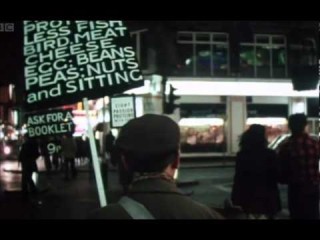I’m on a local history kick at the moment, so watched the London on Film series from 2012, recently repeated. Love The Suburbs and East End ones, and West End for a view into am older Soho, long gone…funny to hear Jeffrey Bernard complain about advertising executives and film people spoiling the place, because they mostly sat beside all the Sodom and Gomorrah…the final nail for Soho was in fact exorbitant rents and the traditional local businesses selling up and chains moving in along with families complaining about the red light areas. It’s mostly died in my lifetime.
Which takes me to another point – apart from the end surprised there is very little about the LGBTQ or black experience in this series (even while filming in the heartland of queer culture, Soho) and what it dwells on, like starting at the ‘Dilly is a tourist outsider view, not a local’s view, despite what it says at the start via the old footage. Quite a lot about the Jewish experience in the East End one, and Indian/Bangladeshi, but seems strangely selective for a documentary in 2012 about what it covers.
Also, surprised that it’s only 3x 30 minute films for all the hundred years of footage the BBC has…in the past it would have many Community Film Units, and open up this sort of thing to others to create and tell their histories…they could do whole Civilisation-level series on the history of London through film footage (please no TV Historians plugging their wares!), maybe taking an Adam Curtis approach but with many people telling their stories through film. For all Auntie’s bleating about no money, hardly costs anyone to throw open their archives to schools and community groups…and then it would be an education in production, editing, accessing archives. Obvious, really, but for all their Open Access ideas they’ve only had fairly token ideas of access and open/crowd sourcing, not very much radical in a long time. It’s usually fulfilled by fairly inane requests for texts and monitoring of tweets during broadcasts, and certainly doesn’t usually result in shows for broadcast.
There should be far more of this sort of thing, and now the digital channels have oodles of space to fill, which could and should lead to more community input (and less bought in filler and playlisting). But unlike the utopian view of the 1960’s and 70’s there seems to be now less input than more. Even the return of partisan views, like the terrible Radio 4 documentary a few years back on Park Hill Flats which in a pre-1960’s Auntie-Knows-Best fashion mostly ignored the local view to make a very upper-class proles-don’t-get-it sort of biasmentary. Class system alive and well, sadly, in a city that saw such things much sharply than London. This just enforces the sort of challenges of bias we see incorrectly from Murdoch and sadly correctly from the Scottish Independents.
That yoke of control needs to be loosened to be more inclusive, and also why aren’t their archives Creative Commons yet? Oh because their contracts were – and probably still are – terrible and allowed producers and writers full rights while working on publicly funded properties, that’s why. More jobs for the boys. Still can’t work out why Terry Nation even owns the Daleks, when they were created for a publicly funded TV show (or at very least subscriber funded, but the Charter comes from the government). Reminds me of Ordnance Survey…paying through the nose again and again for something we already funded, something that if it was in the States as a publicly funded exercise it would have to be freely reusable or open, like NASA’s content. But the stuff which has dropped out of copyright, or doesn’t involve copyrighted music could be made Creative Commons, since the public already paid for it, why should we pay again? I await that with not-that-baited breath…
A good example of what the Beeb was good at, telling a detailed story with humour and education is 1973’s Metro-Land with Sir John Betjeman – indeed you’ll recognise bits from the London on Film – The Suburbs as it leans rather heavily, and I’d say lazily on that classic. I’d seen clips but finally seen it, and it’s great. Well worth tracking down, emphasis on the track-er part of that, if you get my drift 😉
Sadly it seems there isn’t even a short clip to embed (boo! BBC! We paid for that!) so here’s OMD’s Metroland which relies heavily on the documentary for inspiration:


Leave a Comment! Be nice….